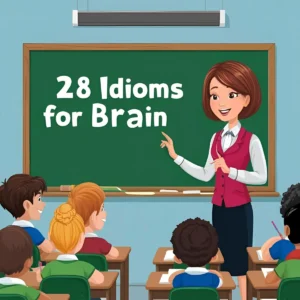Boredom is a universal feeling, and English offers plenty of idioms to describe it in colorful ways. From “watching paint dry” to being “bored to tears,” these expressions make even the dullest moments sound vivid and relatable.
Idioms for boredom are common in everyday conversations, helping speakers express frustration, impatience, or disinterest more naturally. Learning them can add humor and energy to your English.
In this article, we’ll explore 27 popular idioms that describe boring situations, with meanings and examples.
1. As Exciting as Watching Paint Dry
Meaning: Extremely dull or uninteresting.
Example: “That lecture was as exciting as watching paint dry.”
Tone: Sarcastic, humorous.
Other ways to say it: Mind-numbing, painfully slow.
2. A Snore Fest
Meaning: Something very boring.
Example: “The meeting turned into a total snore fest.”
Tone: Casual, humorous.
Other ways to say it: Dull, sleep-inducing.
3. Put Me to Sleep
Meaning: Something so boring that it makes you feel sleepy.
Example: “That documentary put me to sleep within minutes.”
Tone: Casual, slightly negative.
Other ways to say it: Monotonous, tiresome.
4. A Dry as Dust
Meaning: Extremely dull and uninteresting.
Example: “The professor’s lectures are as dry as dust.”
Tone: Descriptive, formal.
Other ways to say it: Lifeless, tedious.
5. A Real Yawner
Meaning: Something that makes you yawn due to boredom.
Example: “That movie was a real yawner.”
Tone: Informal, slightly dismissive.
Other ways to say it: Drag, snooze-fest.
6. Dull as Dishwater
Meaning: Very boring or lacking excitement.
Example: “His speech was dull as dishwater.”
Tone: Negative, descriptive.
Other ways to say it: Uninspiring, lifeless.
7. Dead as a Doornail
Meaning: Completely lifeless or unexciting.
Example: “The party was dead as a doornail.”
Tone: Negative, strong.
Other ways to say it: Lifeless, unenergetic.
8. Watching Grass Grow
Meaning: Something extremely slow and boring.
Example: “That lecture felt like watching grass grow.”
Tone: Sarcastic, humorous.
Other ways to say it: Painfully slow, tedious.
9. Nothing to Write Home About
Meaning: Not interesting or worth mentioning.
Example: “The food was okay, but nothing to write home about.”
Tone: Neutral, dismissive.
Other ways to say it: Unremarkable, forgettable.
10. A Lead Balloon
Meaning: Something that fails to interest people.
Example: “His joke went down like a lead balloon.”
Tone: Negative, critical.
Other ways to say it: Flop, failure.
11. A Broken Record
Meaning: Someone who repeats the same thing over and over.
Example: “He kept talking about his new car like a broken record.”
Tone: Annoyed, informal.
Other ways to say it: Repetitive, monotonous.
12. Bored to Tears
Meaning: Extremely bored.
Example: “That documentary left me bored to tears.”
Tone: Dramatic, informal.
Other ways to say it: Bored stiff, uninterested.
13. Stuck in a Rut
Meaning: Doing the same dull things repeatedly.
Example: “I feel stuck in a rut at work.”
Tone: Frustrated, relatable.
Other ways to say it: Going nowhere, in a loop.
14. Same Old, Same Old
Meaning: The same routine over and over.
Example: “Nothing new, just the same old, same old.”
Tone: Resigned, casual.
Other ways to say it: Predictable, monotonous.
15. A One-Trick Pony
Meaning: Something that only does one thing and becomes uninteresting.
Example: “That TV show is a one-trick pony—repeating the same jokes.”
Tone: Critical, dismissive.
Other ways to say it: Limited, repetitive.
16. Run-of-the-Mill
Meaning: Ordinary and unexciting.
Example: “The performance was run-of-the-mill, nothing special.”
Tone: Neutral, unimpressed.
Other ways to say it: Average, plain.
17. Going Through the Motions
Meaning: Doing something without enthusiasm.
Example: “He’s just going through the motions at work.”
Tone: Disinterested, routine.
Other ways to say it: Lackluster, robotic.
18. A Sleeper
Meaning: Something unexpectedly boring or slow.
Example: “That movie was a real sleeper—I nearly dozed off.”
Tone: Negative, dismissive.
Other ways to say it: Dull, unexciting.
19. A Mind-Numbing Experience
Meaning: So boring that it dulls your mind.
Example: “That three-hour meeting was mind-numbing.”
Tone: Strong, exasperated.
Other ways to say it: Tedious, draining.
20. Drag On Forever
Meaning: Taking too long and becoming boring.
Example: “The speech dragged on forever.”
Tone: Impatient, frustrated.
Other ways to say it: Endless, never-ending.
21. Sucked the Life Out Of
Meaning: Made something dull and lifeless.
Example: “The new rules sucked the life out of the festival.”
Tone: Dramatic, negative.
Other ways to say it: Took the fun out, drained.
22. A Cold Fish
Meaning: A person who is dull and unexpressive.
Example: “He’s a bit of a cold fish—never shows excitement.”
Tone: Unflattering, neutral.
Other ways to say it: Unemotional, lifeless.
23. Like a Wet Blanket
Meaning: Someone who ruins fun with their dullness.
Example: “He’s like a wet blanket at parties.”
Tone: Negative, critical.
Other ways to say it: Killjoy, buzzkill.
24. The Same Old Song and Dance
Meaning: The same boring routine.
Example: “Every Monday, it’s the same old song and dance.”
Tone: Tired, routine.
Other ways to say it: Repetitive, unoriginal.
25. Going Nowhere Fast
Meaning: Stuck in a dull, unchanging situation.
Example: “This job is going nowhere fast.”
Tone: Frustrated, stagnant.
Other ways to say it: Stalled, stuck.
26. Like Pulling Teeth
Meaning: A painfully slow and boring experience.
Example: “Getting him to talk was like pulling teeth.”
Tone: Negative, exaggerated.
Other ways to say it: Frustrating, tedious.
27. All Filler, No Thriller
Meaning: Lacking excitement or substance.
Example: “The book was all filler, no thriller—nothing exciting happened.”
Tone: Disappointed, critical.
Other ways to say it: Bland, uninteresting.
Conclusion
Using idioms for boredom brings a touch of humor and expressiveness to otherwise dull topics. These 27 phrases capture the feeling of monotony in creative, memorable ways that native speakers often use.
Whether you’re “bored stiff” or feeling like you’re “going through the motions,” these idioms help make your English sound more fluent and lively. Practice using them in different contexts to spice up your conversations—even when the subject isn’t exciting!



